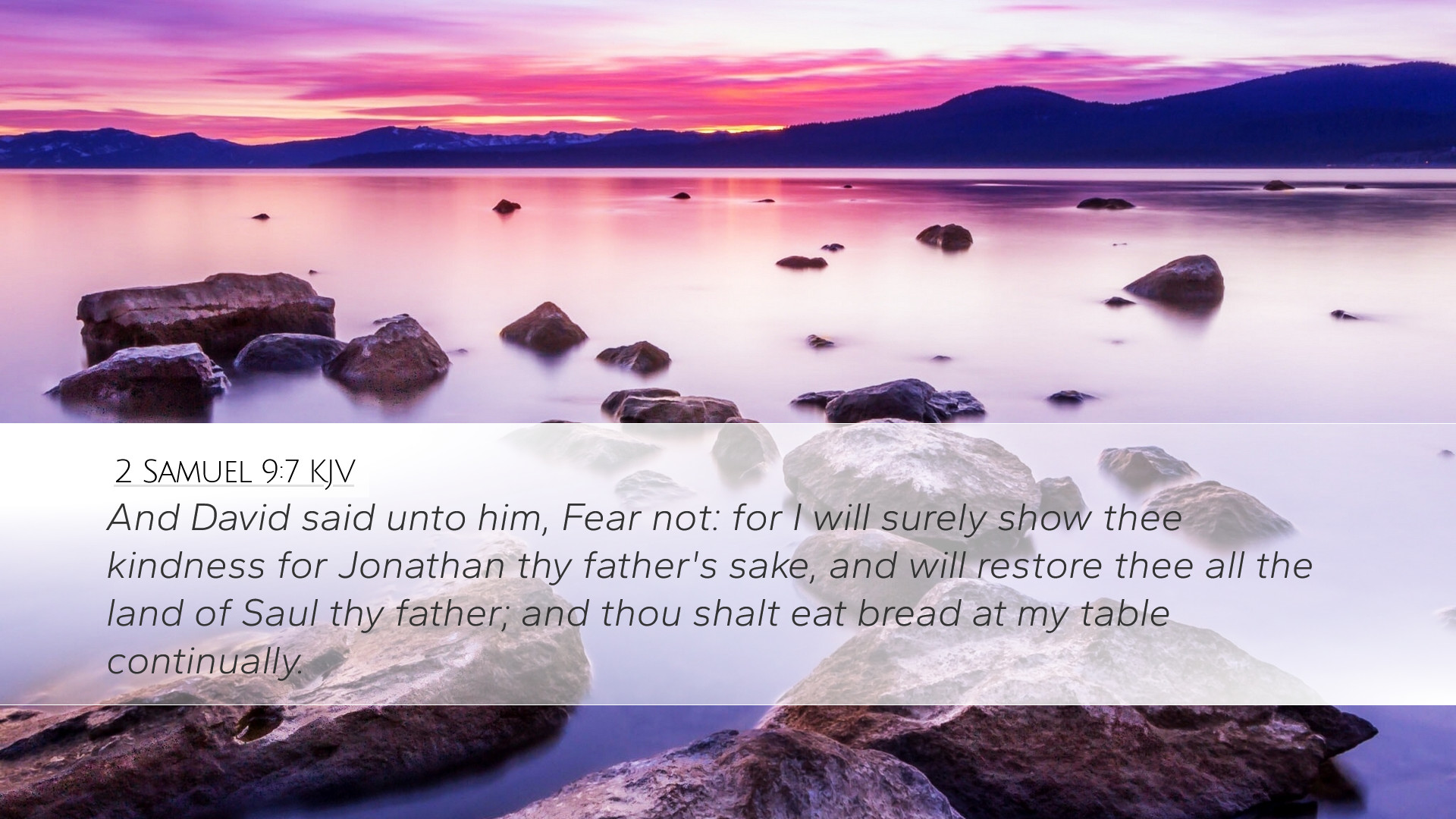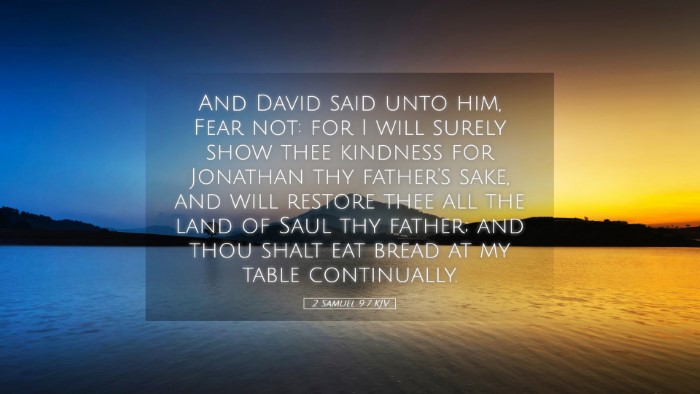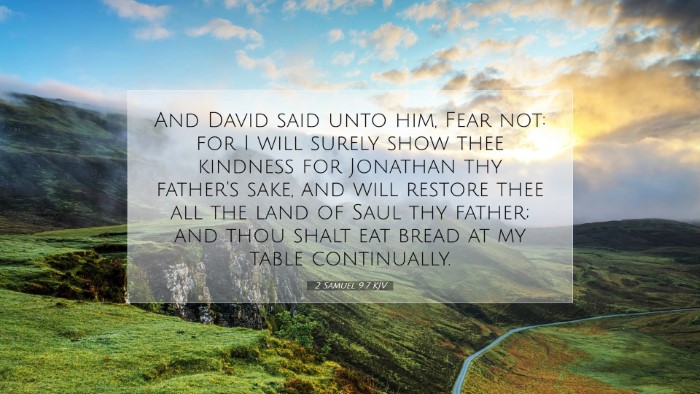Old Testament
Genesis Exodus Leviticus Numbers Deuteronomy Joshua Judges Ruth 1 Samuel 2 Samuel 1 Kings 2 Kings 1 Chronicles 2 Chronicles Ezra Nehemiah Esther Job Psalms Proverbs Ecclesiastes Song of Solomon Isaiah Jeremiah Lamentations Ezekiel Daniel Hosea Joel Amos Obadiah Jonah Micah Nahum Habakkuk Zephaniah Haggai Zechariah Malachi2 Samuel 9:7
2 Samuel 9:7 KJV
And David said unto him, Fear not: for I will surely show thee kindness for Jonathan thy father's sake, and will restore thee all the land of Saul thy father; and thou shalt eat bread at my table continually.
2 Samuel 9:7 Bible Commentary
Commentary on 2 Samuel 9:7
Text of 2 Samuel 9:7: "And David said unto him, Fear not: for I will surely show thee kindness for Jonathan thy father's sake, and will restore thee all the land of Saul thy father; and thou shalt eat bread at my table continually."
Introduction
This passage from 2 Samuel is a powerful demonstration of David's covenant loyalty and fidelity to Jonathan, the son of Saul. It reflects the themes of grace, mercy, and restoration that are prominent throughout biblical narrative. The following commentary draws insights from esteemed public domain commentators, such as Matthew Henry, Albert Barnes, and Adam Clarke, to explore the depth of David's compassion and its theological implications.
The Context of 2 Samuel 9
The chapter begins after the death of Saul and Jonathan, which sets the stage for David's rise to the throne of Israel. Mephibosheth, the son of Jonathan and the grandson of Saul, represents not only the last of Saul's lineage but also a figure of vulnerability and fear amidst the political upheaval. David’s actions here provide a striking contrast to the common practice of eliminating potential rivals in the ancient Near Eastern context.
David's Compassionate Initiative
1. Fear Not: David begins by addressing Mephibosheth’s likely fears. Mephibosheth, having been hidden away due to the threat to his life stemming from his lineage, would have been anxious about David’s intentions. David’s command, "Fear not," can be seen as a gesture of peace and an invitation to intimacy. Matthew Henry notes that David’s words illustrate the nature of divine grace—God's willingness to embrace those who feel unworthy.
2. Kindness for Jonathan’s Sake: The kindness David offers is deeply rooted in his covenant with Jonathan. David’s loyalty to Jonathan transcends death and animosity that might exist between their respective families. Albert Barnes remarks that this act of kindness was not merely for Mephibosheth but was also a fulfillment of a promise that highlights the importance of covenant faithfulness.
The Thematic Elements in the Verse
- Grace and Restoration: The mention of restoring the land signifies not only economic restoration but also social and familial redemption. Adam Clarke emphasizes that this act reflects God’s ability to restore us to a place of honor, regardless of our circumstances.
- Table Fellowship: By inviting Mephibosheth to eat at his table continually, David symbolizes inclusion and acceptance—a shared life of fellowship. This foreshadows the New Testament theme of table fellowship in Christ, inviting sinners to communion with God.
Mephibosheth's Response
The reaction of Mephibosheth is marked by humility and disbelief. He considers himself a "dead dog" in the face of David’s kindness, illustrating a deep sense of unworthiness. Henry reflects that this acknowledgment of his lowliness makes the grace extended to him all the more profound. It reminds us that divine mercy often meets us in our most humble state.
Theological Implications
The richness of this text offers significant theological insights relevant to pastors, students, and scholars:
- The Nature of God’s Grace: The kindness demonstrated by David is emblematic of the grace found in God. Just as David seeks out Mephibosheth, God actively seeks those lost in their shame and insecurity.
- The Importance of Covenant: This passage provides a vivid illustration of the covenant relationship, not only between David and Jonathan but extending towards Mephibosheth. In a theological framework, this mirrors the New Covenant established through Christ.
- Restoration and Redemption: The restoration of land, and acceptance at the royal table is a powerful representation of God’s plan of redemption. It prompts believers to consider how they might extend generosity and kindness in their own ministries.
Conclusion
In 2 Samuel 9:7, we witness an extraordinary act of grace that has profound implications for understanding God's heart towards humanity. David's actions toward Mephibosheth challenge readers to reflect on their attitudes towards justice, mercy, and inclusion, inviting all to the table of grace. This passage remains a powerful reminder of the joy and hope that come from genuine compassion and the unyielding nature of covenant love.


